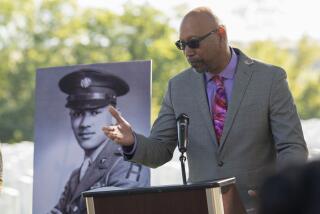Late WWII Hero Finally Gets Medal
- Share via
If Donald Lubansky had been less modest during his lifetime, he might have received his Bronze Star for bravery long ago.
He didn’t talk much about his service in World War II. He was the kind of guy who wasn’t inclined to brag, and typically shrugged off his battles in the Philippines as just doing his job.
And he certainly didn’t mention the hidden-away letter--written by Brig. Gen. Hanford MacNider in 1945--recommending him for one of the military’s more prestigious awards.
It took his death in 1996 for his family to realize just what a hero the U.S. military thought Lubansky was. A few months later, his widow, Amelia, discovered the letter amid his papers and sought to bring him the attention he deserved.
On Monday, more than three years later, she received the medal for him during a short ceremony in Rep. Elton Gallegly’s office in Oxnard. It was an honor her husband had earned halfway across the world nearly 60 years ago.
Never mind that he might think it’s more than he deserved and that his widow suspected he wished Monday’s foul weather on his family just to pull the attention from him.
“If it’s due him, I want him to have it,” she said. “He was proud of being in the service.”
The family, and indeed, the Army, aren’t sure exactly for what specific act of bravery the award is given. The general’s letter refers only to his “gallantry in action,” and calls him a “first-class fighting man.”
Amelia Lubansky suspects it’s from 1944, when the then-19-year-old radio man--who fought with the 147th Field Artillery Battalion--was scouting a Philippine town with two other soldiers. A hail of Japanese bullets buzzed from the trees, and the other two soldiers were killed.
Lubansky’s radio was shot up--which he credited with guarding his body. He rejiggered the badly damaged radio and was able to report to the rest of his unit the approaching threat, his wife said.
It was a story he didn’t tell often. Not even his daughters were fully aware of his role until after his death in December 1996.
“I’m learning a lot,” said his teary-eyed daughter, Donna Lee Lubansky, a paralegal in Santa Monica. “My dad never spoke about the war, besides saying where he was. He’d be embarrassed by all this.”
The award was presented to Amelia Lubansky by Army Lt. Col. Mark Ritter of Fort Irwin in Barstow. She had attempted to pinpoint the whereabouts of her husband’s medal for a year. But after unsuccessful attempts, she asked Gallegly, a Simi Valley Republican, for help in tracking down what her husband deserved.
She believed she was seeking the medal more for his family than for her husband’s memory. Her husband always felt amply rewarded that the military had treated him well, she said. He went to college on the G.I. bill. He spent half his life working as a weapons system test engineer at the Port Hueneme naval base. He was happy.
“I think he felt he had already been paid back,” she said.
Times Community News reporter Katie Cooper contributed to this report.
More to Read
Sign up for Essential California
The most important California stories and recommendations in your inbox every morning.
You may occasionally receive promotional content from the Los Angeles Times.












